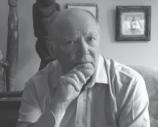Recapitulations
Review
Recapitulations
To simply call RECAPITULATIONS, anthropologist Vincent Crapanzano's new book, an autobiography doesn't seem quite right. To be sure, Crapanzano tells his life story (or a version of his life story) in his dense, free-ranging book. But he has also written an autobiography about writing an autobiography, a thoughtful, intellectually engaging book that looks at how we organize our memories, understand ourselves and the world around us, and create and recreate meaning in our lives.
Crapanzano's life story is certainly worth telling. As a child, he lived on the grounds of the New Jersey mental hospital where his Italian immigrant father worked as a psychiatrist. After his father's sudden death, he spent time in a Swiss boarding school (his classmates included the granddaughter of Haile Selassie) before enrolling at Harvard, where he studied philosophy. A turn in the Army, where he worked as a translator, was followed by graduate studies in anthropology at Columbia, field research in Morocco, the Navajo Nation, South Africa and other locations, and a distinguished career as an academic.
"...a thoughtful, intellectually engaging book that looks at how we organize our memories, understand ourselves and the world around us, and create and recreate meaning in our lives."
These and the other events of his life are described with a self-aware, critical eye, as Crapanzano turns to the tools of his profession to examine his own experiences. Crapanzano's milieu is unique. He goes to dinner parties with Spanish royalty. A family friend named Allen turns out to be none other than Allen Ginsberg, who Crapanzano's wife, New Yorker writer Jane Kramer, has written a book about. In Paris, his acquaintances includes Jacques Derrida (“timid”), Umberto Eco (“bombastic”) and James Baldwin (“he had a self-ironic charisma”). An encounter with notorious psychoanalyst Jacques Lacan is almost too perfect to be believed. But despite the exceptional characters who populate many of his stories, at their core the dramas he recounts all revolve around familiar elements --- childhood humiliations, adolescent awkwardness, fraught relationships with family, romantic longing, professional snubs and jealousy. On one hand, Crapanzano's life seems exotic and adventure-filled, and on the other wholly unremarkable.
The book is roughly linear, beginning with Crapanzano's childhood and ending in the present day. Each chapter uses the events of his life to explore specific themes, such as memory, rites of passage and betrayal. Throughout, he makes frequent digressions, returns again to reexamine things previously discussed, and questions his own biases, beliefs and interpretations of the past. The result is a book that feels dynamic and alive, not a fixed account of a life but rather a record of one man's ongoing, ever-shifting attempt to organize the facts of his existence. This is to be expected, as Crapanzano never forgets his role as an anthropologist. When he looks back on his life, he meditates on the varying ways that different cultures understand concepts such as death, trust and time, incorporating anecdotes from his ethnographic research into other cultures to better understand and contextualize his own actions.
As Crapanzano wends his ways through his life, he also takes readers on a tour through late-20th-century intellectual history. In one chapter, “Is Forgiveness Possible?”, Crapanzano discusses the disgraced literary scholar Paul de Man, with whom he studied at Harvard, pondering how we decide which facts of our past to disclose and which to conceal. (During World War II, de Man contributed anti-Semitic articles to Le Soir, a Belgium newspaper aligned with the Nazis, a past he concealed from friends and colleagues after settling in the U.S.) This gap between the stories we tell about our lives and “the life as lived” fascinates Crapanzano. “We speak of autobiographical truth when we ought, perhaps, to focus on autobiographical dubiety,” he writes.
He also traces some of the battles within American anthropology over the past few decades, including those between the science-focused researchers who “actually believed that they possessed if not the truth then a way --- the only way --- to find it” and those taking a more relativist approach, like himself. Crapanzano rejects the materialism of prominent anthropologists like Marvin Harris. “I found his thought simplistic. I was interested in also everything he dismissed: the individual, subjective experience, symbolism, religion, ritual, belief, art, and…psychological and psychoanalytic approaches to human culture.”
Throughout, Crapanzano remains acutely aware of the impossibility of fashioning anything like a complete autobiography. “There is so much more that I want to write. Maybe I feel as though I need what I have not written in order to preserve myself, must as a secret does.” The ultimate result is an intriguing, perceptive memoir that encourages readers to think more deeply about their own lives.
Reviewed by Megan Elliott on March 20, 2015
Recapitulations
- Publication Date: March 17, 2015
- Genres: Memoir, Nonfiction
- Hardcover: 400 pages
- Publisher: Other Press
- ISBN-10: 1590515935
- ISBN-13: 9781590515938





